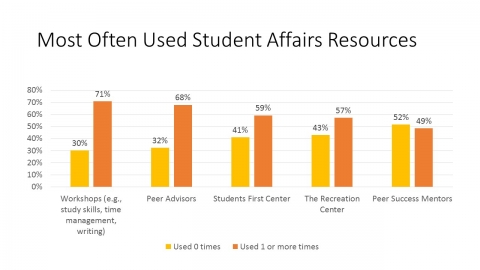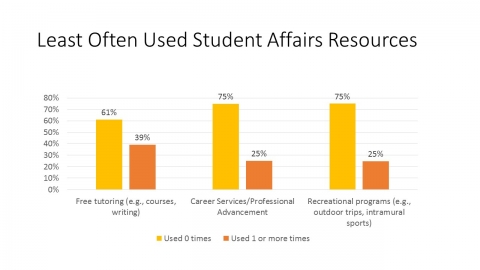Survey Shows Use of Resources Helps Students Succeed
In Fall 2014, 36 percent of new freshmen and transfer students completed a survey about their educational plans, transitions to college and use of campus services. Highlights from the results show a correlation between students’ use of resources provided by the Division of Student Affairs and important learning outcomes.
Resources used most: About 70 percent of respondents reported using workshops and peer advisors at least once; nearly 60 percent reported using the Students First Center and the Joseph E. Gallo Recreation and Wellness Center at least once; and approximately 50 percent reported meeting with peer-success mentors at least once.

Resources used the least: Nearly 40 percent of respondents reported using peer tutoring at least once; 25 percent said they used the Center for Career and Professional Advancement and recreational programs at least once.

Resource use and academic self-efficacy: Academic self-efficacy consists of beliefs that one can succeed academically and overcome academic obstacles. Academic self-efficacy was measured using seven survey items. For example, students were asked to rate how unsure to sure they were that they could do well on problems and tasks assigned in their courses. Their responses were averaged and the higher scores indicated greater academic self-efficacy.
- Academic self-efficacy was significantly correlated with higher expected semester grades and lower intentions to leave UC Merced.
- Regarding resources, respondents who used workshops, peer advisors, peer success mentors and career services had significantly higher academic self-efficacy than respondents who did not use these resources. This could mean that use of these resources leads to greater academic self-efficacy, or that students with higher academic self-efficacy are more likely to seek out and use these resources. Thus, it may be important to find ways to encourage students with low academic self-efficacy to use these resources. Surprisingly, use of free tutoring was not associated with academic self-efficacy. Respondents who used free tutoring had similar academic self-efficacy compared to those who did not use free tutoring.
